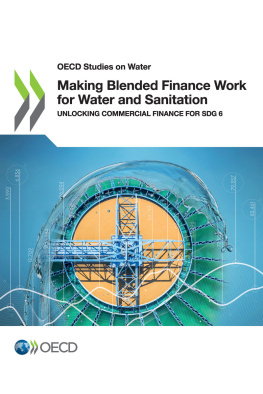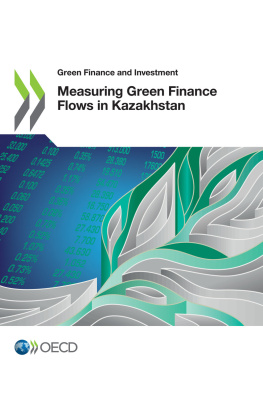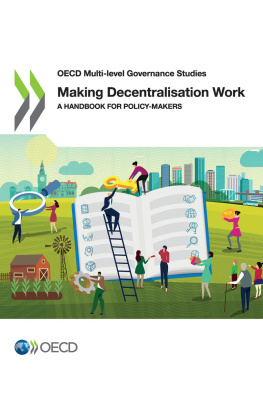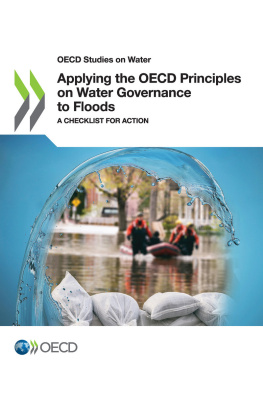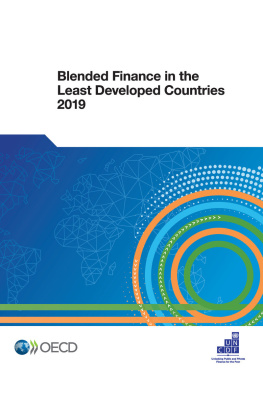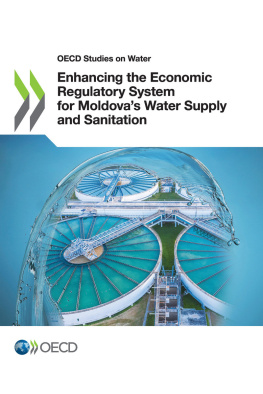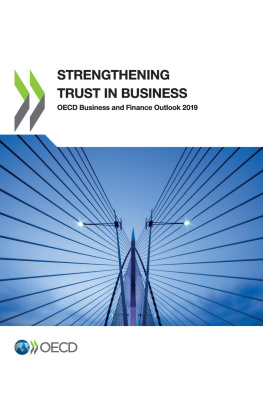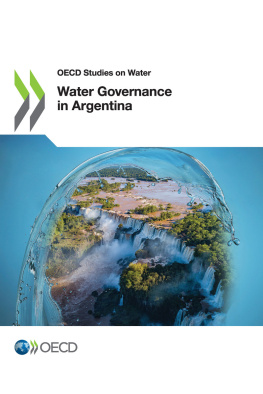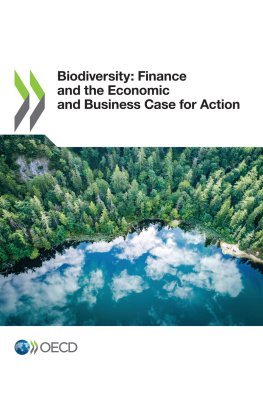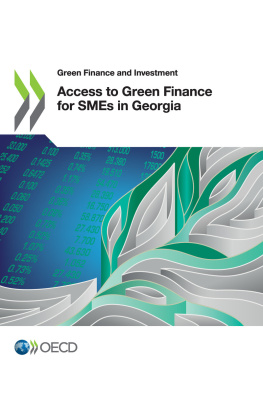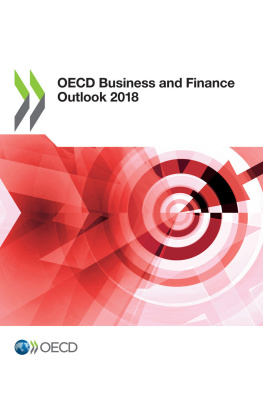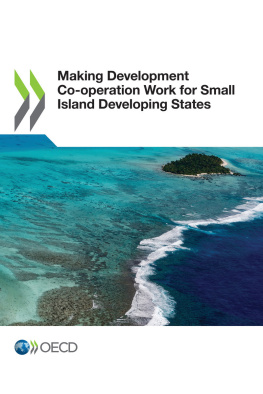OECD - Making Blended Finance Work for Water and Sanitation
Here you can read online OECD - Making Blended Finance Work for Water and Sanitation full text of the book (entire story) in english for free. Download pdf and epub, get meaning, cover and reviews about this ebook. year: 2019, publisher: OECD Publishing, genre: Home and family. Description of the work, (preface) as well as reviews are available. Best literature library LitArk.com created for fans of good reading and offers a wide selection of genres:
Romance novel
Science fiction
Adventure
Detective
Science
History
Home and family
Prose
Art
Politics
Computer
Non-fiction
Religion
Business
Children
Humor
Choose a favorite category and find really read worthwhile books. Enjoy immersion in the world of imagination, feel the emotions of the characters or learn something new for yourself, make an fascinating discovery.
- Book:Making Blended Finance Work for Water and Sanitation
- Author:
- Publisher:OECD Publishing
- Genre:
- Year:2019
- Rating:4 / 5
- Favourites:Add to favourites
- Your mark:
- 80
- 1
- 2
- 3
- 4
- 5
Making Blended Finance Work for Water and Sanitation: summary, description and annotation
We offer to read an annotation, description, summary or preface (depends on what the author of the book "Making Blended Finance Work for Water and Sanitation" wrote himself). If you haven't found the necessary information about the book — write in the comments, we will try to find it.
OECD: author's other books
Who wrote Making Blended Finance Work for Water and Sanitation? Find out the surname, the name of the author of the book and a list of all author's works by series.
Making Blended Finance Work for Water and Sanitation — read online for free the complete book (whole text) full work
Below is the text of the book, divided by pages. System saving the place of the last page read, allows you to conveniently read the book "Making Blended Finance Work for Water and Sanitation" online for free, without having to search again every time where you left off. Put a bookmark, and you can go to the page where you finished reading at any time.
Font size:
Interval:
Bookmark:

OECD (2019), Making Blended Finance Work for Water and Sanitation: Unlocking Commercial Finance for SDG 6 , OECD Studies on Water, OECD Publishing, Paris, https://doi.org/10.1787/5efc8950-en .
With over 2 billion people without access to safe drinking water, 4.5 billion people lacking access to safely managed sanitation, and growing pressures on the quantity and quality of water resources, water and sanitation has been prioritised by the international community as Sustainable Development Goal (SDG) 6. But, it cannot be separated from all aspects of development; whether we achieve SDG 6 will impact every other SDG. Water and sanitation services and water resources management are especially relevant for food security, healthy lives, clean energy, sustainable cities, marine and terrestrial biodiversity and ecosystems. According to the World Health Organisation and UNICEF, 620 million children do not have decent toilets at school and around 900 million lack clean water to wash their hands. This discourages students, particularly girls, from attending school and completing their education. Better water and sanitation in schools is a practical measure to promote the education of the next generation of thinkers and leaders, especially women and girls.
A strong economic case exists for both governments and private actors to invest in water-related investments through blended finance. The annual economic losses due to inadequate water supply and sanitation are estimated at USD 260 billion. Projections of global financing needs for water infrastructure range from USD 6.7 trillion by 2030 to USD 22.6 trillion by 2050.
Although official development finance continues to be indispensable, these flows are far from sufficient to meet massive financing needs. Not only is there a need to unlock alternative sources of financing, but existing sources of finance can be deployed more strategically, so as to strengthen, over time, the financing systems required to deliver water and sanitation services and manage water resources sustainably. Blended finance, the strategic use of development finance for the mobilisation of additional finance towards sustainable development in developing countries, has a key role to play. Blended finance has the potential to attract additional commercial finance as well as act as a market building instrument to provide a bridge from reliance on concessional financing towards more self-sustaining financing approaches. The OECDs Development Assistance Committee (DAC) endorsed Blended Finance Principles in October 2017 providing guidance to donors in designing approaches that mobilise and better target commercial capital towards the full range of SDGs.
Taking stock today, we note that despite progress, blended finance has not gained sufficient traction for water-related investments. To encourage further action, this publication provides insights into how development actors can better deploy scarce financial resources and de-risking instruments to incentivise commercial actors to invest in water-related investments in developing countries. It assesses the instruments, actors and lessons learned from existing blended finance models for a diverse range of water-related investments. It identifies a variety of financial models that demonstrate how strategically deployed development finance can unlock commercial finance for these investments. The report also explores the potential for scaling existing approaches and for deploying blended finance for subsectors (such as off-grid sanitation), where commercial finance has yet to emerge. We would like to encourage stakeholders from governments, financial institutions and donors to draw on these lessons to explore how these models can be applied to new contexts. Our hope is that this work provides a foundation on which others can extend, adapt and scale up these models effectively.
This publication links to and complements two priorities of the OECD. First, the OECDs work on financing water including the Roundtable on Financing Water - a joint initiative of the OECD, the World Water Council, the Government of the Netherlands and the World Bank. Previous discussions at the Roundtable have helped to inform and shape this work and the platform provides an effective vehicle to disseminate the lessons learned. Second, on blended finance, we are working to develop the evidence-base and engage in co-ordination to ensure blended finance delivers on its potential. Under the Tri Hita Karana Roadmap for Blended Finance, a multi-stakeholder framework and partnership for mobilising commercial finance towards the SDGs, governments, development financiers and private sector entities are now working to make blended finance work at scale to deliver the SDGs.
This publication brings together the expertise and experience of these two communities and efforts to disseminate the key lessons from this report will continue to strengthen the linkages between the water and sanitation community and the blended finance community in order to deliver on the 2030 Agenda.

Rodolfo Lacy
Director of the Environment Directorate

Font size:
Interval:
Bookmark:
Similar books «Making Blended Finance Work for Water and Sanitation»
Look at similar books to Making Blended Finance Work for Water and Sanitation. We have selected literature similar in name and meaning in the hope of providing readers with more options to find new, interesting, not yet read works.
Discussion, reviews of the book Making Blended Finance Work for Water and Sanitation and just readers' own opinions. Leave your comments, write what you think about the work, its meaning or the main characters. Specify what exactly you liked and what you didn't like, and why you think so.

